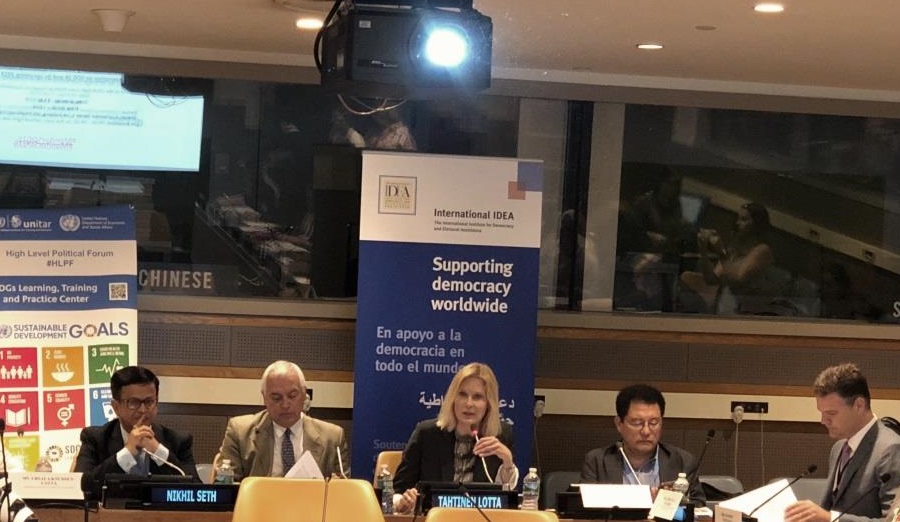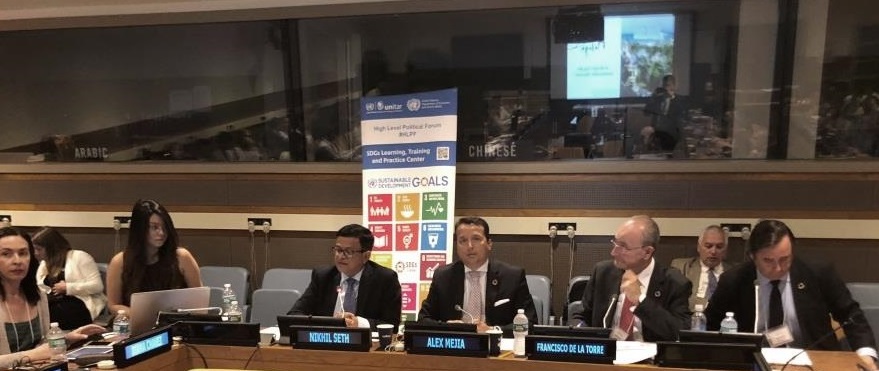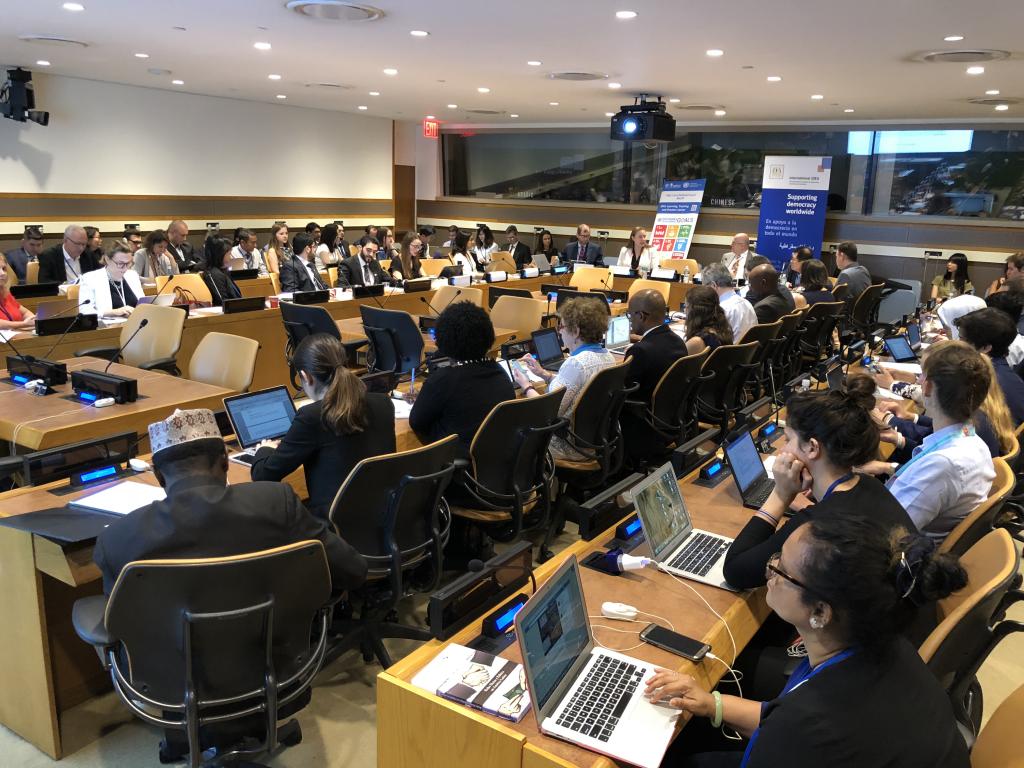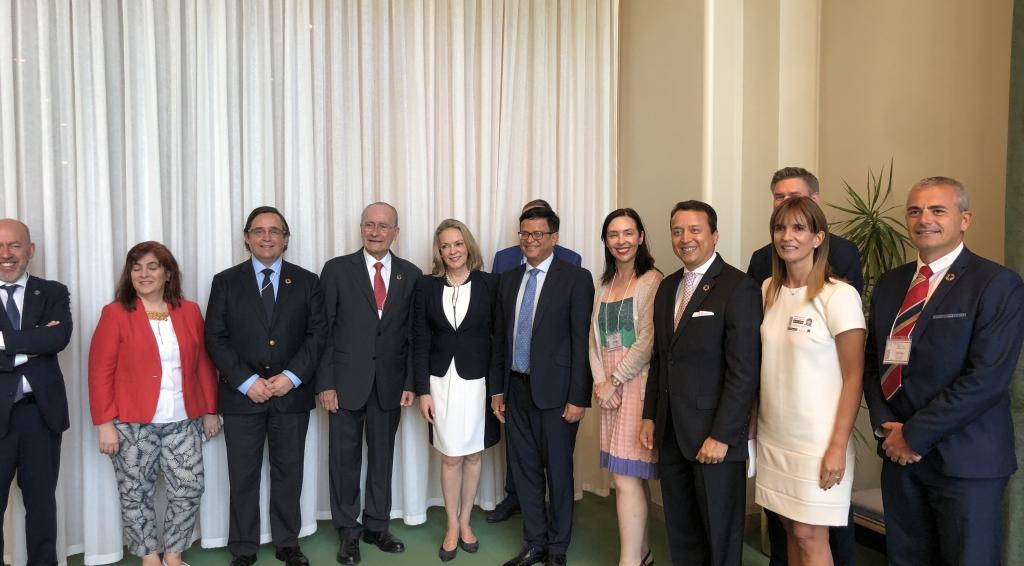UNITAR Launches the First Day of High-Level Political Forum – SDGs Learning, Training & Practice
9 July 2018, New York, USA – The 2018 meeting of the High-Level Political Forum (HLPF) on Sustainable Development Goals Learning, Training and Practice officially opened at United Nations Headquarters in New York. HLPF is the central platform for review of the 2030 Agenda for SDG 6, 7, 11, 12, 15, and 17 with this year’s theme being, “Transformation towards sustainable and resilient societies”.
 UNITAR began the first day with three major workshops: Monitoring Peace, Evaluating Institutions, Building Capacity and SDGs at the Local Level and Decent Work for Sustainable Development: Capacity Building Tools. Mr. Nikhil Seth, Executive Director of UNITAR and UN Assistant Secretary-General, launched the first day of the SDGs Learning, Training and Practice by giving a keynote address. Mr. Seth stressed the importance of SDGs and a platform like High-Level Political Forum that allows opportunities for delegates, representatives from non-governmental organizations and those from private sectors to strengthen their knowledge, skills and capacities in key areas related to the implementation of the SDGs.
UNITAR began the first day with three major workshops: Monitoring Peace, Evaluating Institutions, Building Capacity and SDGs at the Local Level and Decent Work for Sustainable Development: Capacity Building Tools. Mr. Nikhil Seth, Executive Director of UNITAR and UN Assistant Secretary-General, launched the first day of the SDGs Learning, Training and Practice by giving a keynote address. Mr. Seth stressed the importance of SDGs and a platform like High-Level Political Forum that allows opportunities for delegates, representatives from non-governmental organizations and those from private sectors to strengthen their knowledge, skills and capacities in key areas related to the implementation of the SDGs.
Monitoring Peace, Evaluating Institutions, Building Capacity
The Monitoring Peace, Evaluating Institutions, Building Capacity: A data-driven conversation on SDG 16 and its upcoming 2019 review, was presented in collaboration with International Institute for Democracy and Electoral Assistance (International IDEA) with a focus on SDG 16 of Peace, Justice, and Strong Institutions. Many of the presenters shared the notion that sustainable development and peace go hand in hand, stating, “There can be no sustainable development without peace and no peace without sustainable development”. This workshop sought to engage with other organizations and alliances working on SDG 16 data, as well as national experts, and civil society, to obtain a more holistic view of where we stand in relation to the 2019 review of SDG 16, and to identify and coordinate effective approaches to address gaps over the next year. Representatives from international non-governmental organizations such as SaferWorld and Asia Development Alliance presented their perspectives.
 SDGs at the Local Level
SDGs at the Local Level
The SDGs at the Local Level was presented in connection with CIFAL to highlight the five major SDGs being discussed this year to showcase local practical solutions and best practices that contribute to advance the SDGs, while providing an opportunity for peer-to-peer collaboration. During this workshop, each speaker was given time to share their local experience from their native countries in support of the SDGs. Mr. Seth reminded us that sustainable development efforts are not just being made internationally but domestically in places like New York City as well. Mr. Francisco de la Torre, Mayor of Malaga discussed how agreements between public sector and private sector have helped Malaga, Spain become a model city for sustainable tourism. He stated that it is important to first have good governance from the public administration to build attractive destinations with high standards of living for local residents. This in return, these places also becomes attractive for tourists.
 Decent Work for Sustainable Development: Capacity Building Tools
Decent Work for Sustainable Development: Capacity Building Tools
In partnership with International Labour Organization (ILO), this workshop looked to help promote jobs and enterprise, guaranteeing rights at work, extending social protection and promoting social dialogue are the four pillars of the ILO Decent Work Agenda with gender as a cross-cutting theme. Welcoming remarks were given by Mr. Marco Suazo, Head of UNITAR New York Office who stated that decent work not only lifts people out of poverty, but also recognizes the intelligence, skills and resourcefulness of the human being as main contributor to the well-being of society and the economic development of a country. The workshop touched endorsed that the success and achievement of the SDGs depends on reaching those farthest behind by giving them decent employment opportunities and acknowledging their great economic contribution. This interactive session also introduced the DW4SD Resource Platform, an innovative tool to advance relevant decent work approaches and strategies.
 UNITAR- CIFAL Bogota Agreement
UNITAR- CIFAL Bogota Agreement
The beginning of HLPF also marked an important cooperation agreement between UNITAR and CIFAL regional center in Bogota, Colombia. CIFAL is a French acronym for International Training Centre for Authorities and Leaders “Centre International de Formation des Authorites et Leaders”. Together, UNITAR and CIFAL looks forward to promoting training activities aimed at enhancing the capacities of private sector, civil society organizations, C-Suite executives, government officials and leaders from Latin America and the Caribbean in areas related to sustainable development. Overall goals of such a partnership will allow for a better understanding of local and global development issues as well as integrate economic, social, cultural, and environmental dimensions of development especially in the Latin America and Caribbean area.
Throughout the whole week, UNITAR is working with the United Nations Department of Economic and Social Affairs (UN DESA) to host many of these SDGs Learning, Training and Practice workshops. High-Level Political Forum on Sustainable Development is held under the auspices of the UN Economic and Social Council (ECOSOC) at UN Headquarters in New York.
Leadership in the Public Sector
In a special-event, UNITAR and UNDESA officially launched their new United Nations Leadership Learning Platform (UN Leadership:Learn). Innovative leadership and management will be essential for organizations in all sectors to integrate sustainable development goals into strategic plans and operational activities in service of realizing the 2030 aspirations. The performance of any country, in seeking to achieve the SDGs, to a large extent depends on its public sector leadership. Effective leadership translates into prudent public policy formulation and implementation, as well as good public service delivery, to meet the needs and aspirations of citizens.
In response, UN Leadership:Learn provides access to training on leadership development and assists countries to integrate leadership training in formal and informal education systems. It targets primarily three sets of stakeholders from least developed countries (LDC) and small island developing states (SIDS): public sector officials, schools of public administration, and government entities. For these stakeholders, the platform offers training courses, facilitates access to knowledge and tools, and provides support in the design and implementation of effective leadership training.


